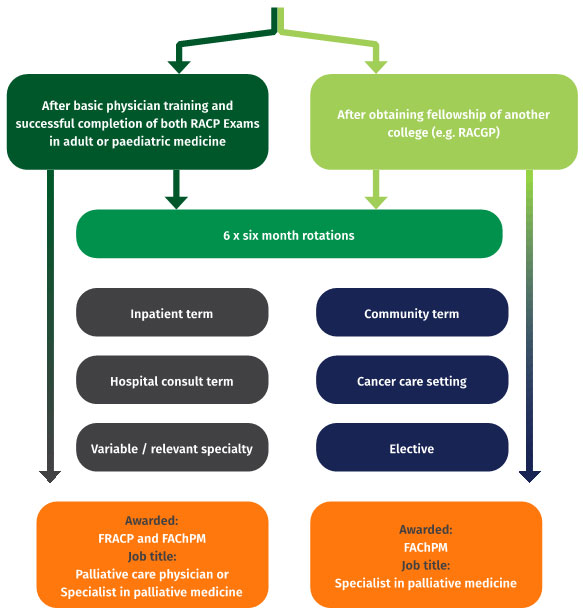Pathways to Entry
There are two pathways to becoming a palliative medicine specialist.

Both training pathways currently consist of work-based learning and assessment. After 36 months of certified training time a trainee will have completed:
- 24 months of core training, including
- 6 months of inpatient unit/hospice
- 6 months of community setting
- 6 months of teaching hospital/consultation
- 6 months of cancer care setting
- 12 months of non-core training including
- 6 months of palliative medicine variable or related speciality
- 6 months of elective training
- 1 x Advanced Training Research Project
- 1 x Case Study
- Australian Aboriginal, Torres Strait Islander and Māori Cultural Competence and Cultural Safety online course (trainees who commenced in 2023 onwards)
- Communication Skills Workshop (recommended)
- RACP Online Learning: Pain Management modules
From 2026, a revised Palliative Medicine Advance Training curriculum will be introduced.
Visit the RACP website for more information here.
Most required training terms can be completed in collaborating RRIPM network sites. Together with your supervisor, a plan to ensure quality experience across the curriculum will be developed. At least one placement in a metropolitan centre is also encouraged.
Rural services are more flexible in their model of palliative care delivery and in recognition of the rural model of care, from 2026, an integrated rural term combining two core terms over a 12-month period will be trialled in 4 RRIPM sites nationally.
The advantages are clear with less relocation required during training, greater continuity of care for patients, and much deeper involvement in the leadership of your patient’s whole palliative care journey.


